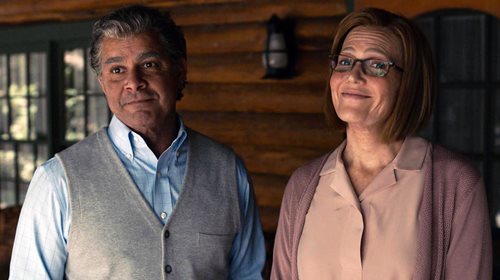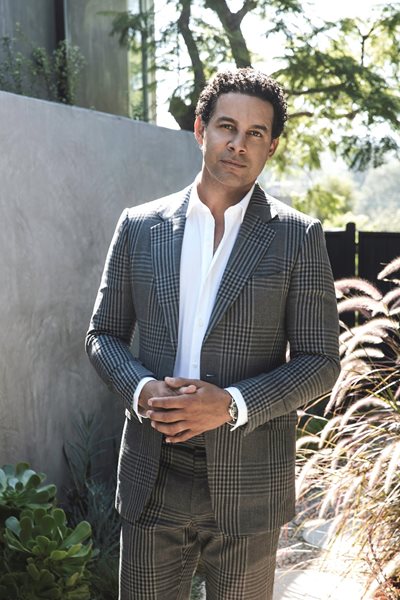Hit television show “This Is Us” has long been a fan favorite due to its powerful familial storylines, depicted within different timelines, providing insight into the characters’ pasts. Jon Huertas stars as Miguel, second husband of the Pearson family matriarch Rebecca (Mandy Moore), who was diagnosed with early-onset Alzheimer’s last season. We talked to Jon about how Alzheimer's disease plays into the upcoming season, and how it has touched him personally.
Congratulations on being back to filming “This Is Us.” What has the experience been like during the COVID-19 pandemic?
2020 has been a terribly tough time for people. We didn’t know if we would be able to film at all this year, so just starting to get back to filming the first few episodes of the show has been so gratifying.
 I’m excited to see our crew working again and I can tell that everyone is really excited to be back with the protocols that have been put into place for everyone’s safety as we navigate the pandemic. We have over 200 crew members who do not have the luxury of a year-long break. They have bills to pay, families to care for.
I’m excited to see our crew working again and I can tell that everyone is really excited to be back with the protocols that have been put into place for everyone’s safety as we navigate the pandemic. We have over 200 crew members who do not have the luxury of a year-long break. They have bills to pay, families to care for.
Everyone who works on the show knows how special this experience and journey is to both us and to our audience, who have long been anticipating this season. Seeing how the show affects people is humbling, and makes it easy to be 100% feet in and ready to go.
Last season, we learned Rebecca (Mandy Moore) has early-onset Alzheimer’s. What can you share about how Alzheimer’s will play a part in the upcoming season?
The show introduced Rebecca’s diagnosis of early-onset Alzheimer’s disease last season, when my character and Rebecca’s son Kevin (Justin Hartley) go with her to the doctor to get the results of her MRI. The aftermath of that is what the show will be tackling this season.
The COVID-19 pandemic is going to be brought into the new season as well, and viewers will have to wait to see exactly how this is approached. “This Is Us” was designed for things like this — bringing the challenges of what is happening in the real world into the lives of these characters in this modern moment. Not every television show can do that.
As many doctor’s offices were closed and appointments were cancelled or pushed back when COVID first hit, you have to think about how that is affecting care and clinical trials, including the Alzheimer’s trial that Rebecca is part of on the show. Some may still be happening virtually, while others may be on hold, or shut down permanently.
The show’s ability to go back in time and circle back to contemporary times may be informed by how our country has responded to this disease, and the path we currently find ourselves on. I’m looking forward to seeing how Rebecca's involvement in a clinical trial during the times of COVID will be incorporated into the storyline.
You have personal connections to Alzheimer’s and other dementia. Tell us about those experiences.
My father-in-law, who has since passed away, was exhibiting symptoms of Alzheimer’s within the last few years of his life. My wife, Nicole, knew something was different about her father. I had known him for 15 years, and I sensed that he was coping with challenges in how he went through the world, how he saw things, how he comprehended them. Naturally, Nicole noticed the most, as she knew him better than anyone.
Nicole’s father was a veteran, and after we were able to get him into the VA hospital, he was given a diagnosis of Alzheimer’s. But, as many families experience, getting a diagnosis was not an easy road. As doctors kept running cognitive testing, they started to question their own diagnosis. When he died suddenly at age 85, we took solace in the fact that he received his diagnosis in his early 80s and lived a full, wonderful life.
My mom has had several falls, and now my sister and I find ourselves working with neurologists in order to find a diagnosis to determine what is happening with her. I admit that it is scary, being on the show and talking about Alzheimer’s disease in these scripts, and then being faced with the prospect of this disease in my own family. But I feel more prepared when it comes to my mom, having experienced what we have with my father-in-law.
When preparing for your evolving role on the show, you spoke to David Sims, a former nurse and care partner to his husband Ed Patterson, who is a former Alzheimer’s Association National Early-Stage Advisor. Tell us about that experience.
What I thought was really insightful about connecting with David and learning about his experience as a care partner was how receptive his husband Ed was to the idea of David becoming his caregiver, and how they are truly facing the disease together. I think I will bring that to my role, if and when we face Rebecca's decline due to Alzheimer’s disease. It was beautiful to hear about two people who are in love, making a commitment to deal with the hard times together.
David and Ed are 100% committed to one another and to living the best life they can as they face the disease. If I bring the experience of speaking with David to the show, it would be interesting to view those scenes from the audience's perspective, watching how two people facing something together can make the journey easier.
One thing David said really stuck with me: “Every day is a new day.” He and Ed have each other and no matter what is happening with Ed, David will cherish it. He cherishes the good days and the bad days with the disease, each moment, as they come.
November is National Alzheimer's Disease Awareness and Family Caregivers Month. Knowing that so many family caregivers are facing Alzheimer’s during these unusual times, what message of hope do you share?
I think it’s important to be able to rely on the people around who love you: lean on them, and communicate with them. Don’t be afraid to ask for help and take time for yourself. What I've learned from the age of COVID is that relying on people around you that you love, whether that is family, friends or neighbors, will help get you through whatever the world throws at you.
 There is a feeling you get when you can trust someone, and rely on them. Pay attention to that feeling. It will guide you to the helpers, the people who will be here no matter what. Humanity comes with a certain sensibility that recognizes the people who will step up for you. It's almost instinctual. If we can find it, we hold onto it.
There is a feeling you get when you can trust someone, and rely on them. Pay attention to that feeling. It will guide you to the helpers, the people who will be here no matter what. Humanity comes with a certain sensibility that recognizes the people who will step up for you. It's almost instinctual. If we can find it, we hold onto it.
2020 has been a time for reflection and looking within, because so many of us are limited to what we can do in life right now. Not using this time would be wrong. Whether you like to run, or meditate, or ask yourself hard questions when you look in the mirror… you may surprise yourself and realize that you already have the answers.
How would you encourage families to face the stigma around Alzheimers and talk openly about signs or symptoms of the disease in a loved one?
While an Alzheimer’s diagnosis is a scary thing, we know that people can still live very fulfilling lives in the early stages of the disease. Recognizing symptoms of the disease and speaking up about them, spending time with the people you love and understanding that none of us has control over every part of our lives makes the process a bit easier.
But I also know how hard these conversations can be. My mother-in-law lives three blocks from me and Nicole and is at our house often. Now in her mid-70s, we also think she may have some form of cognitive decline. We love my wife’s mom so much, but when we bring up the topic of dementia, she has an adverse response to the topic.
No one wants to think about the idea that they may have Alzheimer’s or dementia, and my wife’s mom is a very proud, strong-willed woman. It's hard, and a simple conversation may end in a dispute. I don’t want the words I say to anyone I love to be taken as negative. I really want the stigma of dementia to dissipate, and for people to have open conversations about these scary topics in order to be better prepared for the future.
How has your experience with Alzheimer’s shaped how you approach every day?
I come from a place of logic and reason, and I see every day through the lens of being an amazing day. Aging is part of life, and there is no life without death. I live every moment as if it could be my last. If a diagnosis of Alzheimer's or dementia comes for me, I hope I will have lived my life fully.
Facing our own mortality can be scary, but it makes us a little wiser than we used to be. As long as we can embrace that and face a diagnosis, even in the age of COVID, when life is more difficult for so many, we can push through, if we do it together and are willing to ask for help.
.
As part of the cast of “This Is Us,” it is amazing to have support from our community of viewers, especially when it comes to important topics like Alzheimer’s and dementia and reducing the stigma of the disease. I am grateful to be working on the show right now. It is a reminder to cherish the ones you love, trusting that they will show you love in return.
About: Born in New York, New York Jon Huertas is an actor and producer, known for “This Is Us, “Castle” and “Generation Kill.” Prior to his acting career, he enlisted in the U.S. Air Force in 1987, serving for 8 years. He lives in Los Angeles with his wife, Nicole.
Photo of Jon Huertas and Mandy Moore: Courtesy of NBC
Photo of Jon: Credit to Diana Ragland
Related articles:
Approaching Memory Loss Concerns
Early / Younger-Onset Alzheimer’s
Clinical Trials: How to Get Involved